#woocommerce add theme support
Text
WoodMart - Multipurpose WooCommerce Theme: Enhancing Your E-commerce Experience
In today's digital age, establishing a successful online presence is crucial for businesses of all sizes. With the rapid growth of e-commerce, having an attractive and functional website is essential for capturing the attention of potential customers and driving sales. WoodMart, a multipurpose WooCommerce theme, offers a comprehensive solution for creating a stunning online store that stands out from the competition. In this article, we will explore the features and benefits of WoodMart and how it can enhance your e-commerce experience.
1. Aesthetically Pleasing Design:
WoodMart provides a wide range of professionally designed templates and layouts that are visually appealing and customizable to suit your brand identity. Whether you're selling fashion, electronics, furniture, or any other product, WoodMart offers beautiful and modern designs that captivate your audience and create a positive user experience.
#woocommerce theme#woocommerce themes#best woocommerce theme#fastest woocommerce theme#astra woocommerce theme#elementor woocommerce theme#woocommerce themes free#wordpress woocommerce theme#best free woocommerce theme#how to install woocommerce theme in wordpress#electro electronics store woocommerce theme#woodmart - multipurpose woocommerce theme#woocommerce theme free#woocommerce theme astra#woocommerce add theme support#wordpress theme astra#wordpress theme and plugin detector#wordpress theme avada
2 notes
·
View notes
Text
WordPress Development Services
WordPress development services refer to the professional services provided by individuals or companies to design, develop, customize, and maintain websites using the WordPress content management system (CMS). WordPress is a popular and widely-used platform for creating websites and blogs due to its user-friendly interface, flexibility, and a vast array of themes and plugins available.
These development services may include the following:
Website Design and Development: Creating custom WordPress themes or modifying existing themes to match the client's branding and design requirements.
Plugin Development: Building custom WordPress plugins to add specific functionality to the website that is not available in off-the-shelf plugins.
Website Customization: Tailoring existing WordPress themes to suit the client's unique needs and preferences.
E-commerce Solutions: Setting up and customizing WordPress websites to function as online stores using plugins like WooCommerce.
Responsive Web Design: Ensuring that the website is optimized for various devices such as desktops, tablets, and smartphones.
Website Migration: Assisting in migrating existing websites from other platforms to WordPress.
Website Maintenance and Support: Providing ongoing maintenance, updates, and technical support to ensure the website remains secure and up-to-date.
Search Engine Optimization (SEO): Optimizing the website's structure and content to improve search engine rankings and organic traffic.
Performance Optimization: Enhancing the website's speed and performance to provide a better user experience.
Content Management: Setting up and organizing content to make it easy for the website owner to update and manage.
When looking for WordPress development services, it's essential to consider the provider's experience, portfolio, reviews, and pricing to ensure they can deliver the desired results for your website.
3 notes
·
View notes
Text
From Zero to Hero: How Betheme WordPress Transformed My Business!

"Betheme" is a popular WordPress theme developed by Muffin Group, known for its versatility and extensive customization options. With over 500 pre-built websites and a user-friendly interface, Betheme aims to cater to a wide range of industries and website types. In this detailed review, we'll explore the features, performance, flexibility, and overall user experience of Betheme for WordPress.
Design and Customization: One of the most significant strengths of Betheme is its wide variety of pre-built websites. Upon installation, users can choose from over 500 professionally designed templates, each tailored for specific niches such as business, portfolio, blog, e-commerce, and more. The designs are visually appealing and modern, helping users kickstart their projects with ease.
Customization options in Betheme are extensive. The Muffin Builder, the theme's proprietary page builder, allows users to create layouts through a drag-and-drop interface. This builder is flexible and user-friendly, enabling users of all skill levels to create unique and visually appealing web pages without writing a single line of code. Additionally, the Theme Options panel offers an array of settings to personalize the theme's appearance, typography, colors, and more.
Performance: In terms of performance, Betheme generally performs well. It is essential to note that the sheer number of features and customization options can sometimes affect the loading times. While it's tempting to activate numerous features and plugins, users should exercise caution and choose only what's necessary for their website's optimal performance. Implementing caching and optimizing images is advisable to enhance speed and reduce loading times.
Responsive Design: Betheme is built with responsiveness in mind, ensuring that your website adapts well to different screen sizes and devices. Whether it's viewed on desktops, tablets, or smartphones, the theme's design remains visually appealing and functional, offering a seamless user experience across various platforms.
SEO Friendliness: Search engine optimization (SEO) is a critical aspect of any website's success. Betheme is built with clean code and follows best practices, which positively impacts SEO efforts. Users can also optimize their content through the Yoast SEO plugin or similar tools to enhance the visibility of their websites on search engines.
Plugin Compatibility: Betheme boasts extensive compatibility with popular WordPress plugins, making it a flexible choice for various website needs. The theme seamlessly integrates with plugins like WooCommerce for e-commerce functionality, WPML for multilingual support, Contact Form 7 for forms, and many more. This compatibility adds significant value to Betheme, as users can easily extend their website's capabilities without any hassle.
Documentation and Support: Betheme provides comprehensive documentation, which is easily accessible on the developer's website. The documentation covers all aspects of the theme, from installation and setup to customization and troubleshooting. Additionally, Muffin Group offers support through a dedicated support forum and ticket system. While the support is generally prompt and helpful, some users have reported occasional delays in response times during peak periods.
Price: Betheme is available on ThemeForest, a popular marketplace for WordPress themes. The theme is reasonably priced, considering the vast array of features and pre-built websites it offers. Users have the option to purchase a regular license, which includes lifetime updates and six months of support, with the option to extend support for an additional fee.
Conclusion: Betheme is a feature-rich and versatile WordPress theme that caters to a broad range of website types and industries. With its extensive customization options, responsive design, and compatibility with popular plugins, it empowers users to create stunning websites without much technical expertise. However, users should exercise caution to avoid excessive feature bloat, which could impact website performance. Overall, Betheme is a compelling option for those seeking a flexible and customizable WordPress theme.
Try Betheme WordPress Theme
2 notes
·
View notes
Video
youtube
10 Reasons to Choose WooCommerce
There are numerous internet business trucks out there. Some are feature packed however too extreme to even consider using, while others are costly to run. As an entrepreneur if you need a shopping basket that you can easily oversee all alone and simultaneously profit the vital features available to be purchased and change enhancement, nothing can be a preferred choice over WooCommerce.
The WooCommerce shopping basket plugin can help you send off a self-facilitated, WordPress-based online store in a matter of moments. The following are 10 reasons why Woocommerce is viewed as ideal for private companies.
1. It is Free
It is a free open source plugin. Its extra expansions and support likewise cost less contrasted with different trucks. Thusly, it decreases your general financial plan making this plugin ideal for private ventures and start-ups.
2. Enormous Adaptability
This is maybe the main advantage of this online business plugin where traders, using this stage, can partake in a ton of adaptability with their items even without having legitimate information about its specialized tasks.
3. A greater number of Features than Internet business
WooCommerce doesn't drive its users to go past their usual range of familiarity while building an online store. For instance, the users can construct a completely practical store inside an expert website alongside an incorporated blog page. This large number of aspects of a business are outfit in one spot and introduced together flawlessly in this stage, which isn't generally imaginable with other online business advances or plugins.
4. Likeness with WordPress
Discussing WordPress, a broadly famous CMS stage that supports in excess of 61% of the main million websites, the users of WooCommerce can recognize the user-accommodating WordPress interface. Comparability it adds a ton of significant worth and saves a lot of your time.
5. Enormous Customization Choices
Being free doesn't make WooCommerce an unbending stage. If truth, users get a ton of space to customize and change their online stores to oblige remarkable features as per the need of the business.
6. Proficient yet basic
Despite the fact that it's a free and user-accommodating stage, you shouldn't believe that it isn't sufficiently proficient. Inbuilt with the stage is a nitty gritty request following office with customer commitment instruments that permit purchasers to see past and open requests.
7. Easy Examination
The implicit examination framework in WooCommerce gives you careful knowledge into the everyday investigation the traffic, user conduct and that's just the beginning. Figures like complete deals, normal request deals, individual customer insights, these are flawlessly introduced by means of diagrams, without the users truly leaving their administrator board.
8. Applications Store
There are many Woocommerce augmentations accessible in its application store. From these augmentations, one can find applications connecting with installment, bookkeeping, promoting and announcing.
9. Scope for development
Like other ecommerce plugins or augmentations, it additionally permits its users to practice development and extension as far as how you deal with your items, store and customers.
10. Charm themes
With these Charm themes users can profit from local area discussions, video instructional exercises and that's only the tip of the iceberg.
2 notes
·
View notes
Text
2023's Best-Selling WordPress Themes
Avada | Website Builder For WordPress & WooCommerce
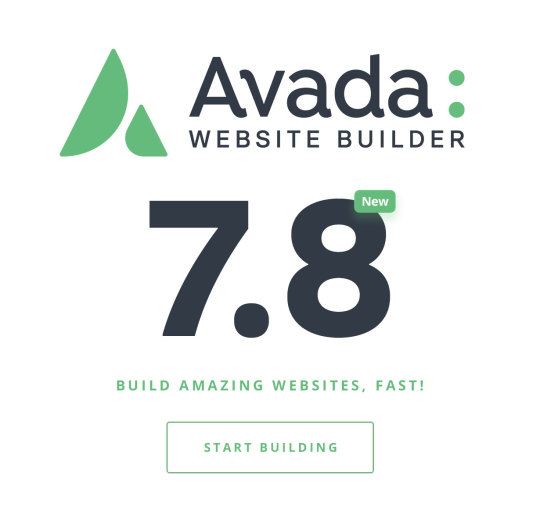
Avada 7.9 is live! This feature-rich version introduces an expansive range of workflow advancements and new features. The list is long, so for starters: We have introduced the brand new Mega Menu Builder, Maintenence Mode/Coming Soon options, new Design Elements, Role Manager options for the Builder, advanced styling and animations options for numerous Elements, and so much more.
Click To Learn More About Avada...
The7 — Website and eCommerce Builder for WordPress
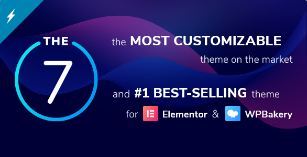
The7 - the Most Customizable Theme on the Market
The7 is the most customizable WordPress, Elementor, and WooCommerce theme available on the market up to date. It gives you creative freedom that no other theme can match. No matter if you are a beginner or a pro, a website owner, a creative professional, or a digital agency - The7 offers tremendous power and unparalleled value to everyone.
The7 is designed to work in synergy with Elementor and WooCommerce. But it is so much more than the sum of the parts!
If you have ever tried to build a website header or customize a product page with vanilla Elementor, you know what pain it is. But not with The7. We have crafted a comprehensive set of tools to build unique headers, product lists, and individual pages - you can target literally any part of your website. And do so without writing a single line of code.
You will not find a theme, a plugin, or any other tool that can match the level of customization The7 offers.
The7 packs all the features you expect from a modern multipurpose theme and much more! Here are some of them:
Click To Learn More about The7...
Betheme | Responsive Multipurpose WordPress & WooCommerce Theme

Betheme is the best product we ever did. This is more than just WordPress theme. Such advanced Theme Options panel and the Muffin Builder tool give unlimited possibilities. To show you how the theme works, we have created 650+ thematic websites so you can see how amazing this product is.
It can not be described with any words. You must see it!

Betheme is full of different pre-built websites so you can easily import any demo website within seconds at 1 click. Constantly we add new demos at users' requests.
So far we created websites for: electric, veterinarian, loan agency, charity agency, sitter, moving company, barber, health magazine, book writer, plumber, art agency, interior design company, webmaster, application, seo agency, university, event company, developer, car rental, band, gym, designer, marketing agency, hosting company, travel agency, real estate company, photographer, renovator, small business company, hotel, mechanic, lawyer, school, shop and much more.
If you have your own idea for a great homepage, please do not hesitate and tell us about that. We consider all your ideas!
Click To Learn More...
Flatsome | Multi-Purpose Responsive WooCommerce Theme

Flatsome is the Best Selling WooCommerce Theme Ever
Flatsome is the most used and trusted theme for any kind of WooCommerce Project. We always support the latest WooCommerce versions so Flatsome is the safest theme for your project.
Flatsome Overview
Free Lifetime updates!
WordPress 4.9, 5.0, 5.8, 5.9, 6.0 + Ready
WooCommerce 3.9, 4.9, 5.5, 6.0 + Ready
WPML Ready (.po files included)
SEO Optimised
Drag and Drop Page Builder
Online Documentation – Supports Chrome, Safari, Firefox, IE8+
Catalog Mode Option (Hide cart and checkout functionality)
Easy Updates using Envato WordPress Toolkit
Child Theme included
Demo content included!
PSD files and assets included
Click To Learn More...
WoodMart - Multipurpose WooCommerce Theme

WoodMart is a premium theme optimized for creating WooCommerce online stores that provides a super-fast interface for the ultimate user experience
Compatible with the latest version of WordPress 6.0+ and WooCommerce 7.0+
WoodMart WooCommerce theme doesn’t require tons of plugins to run your online store. The most important features come out of the box and you don’t need to purchase anything extra. Wishlist, compare, product swatches, AJAX filters, built-in slider, and other features will save you from installing at least 10-20 unnecessary plugins. Use our quick setup wizard and run your online store in a few clicks.
Click To Learn More...
#wordpresstheme#wordpressthemes#wordpressthemedevelopment#wordpressthemedevelopers#videomarketing#makemoney#marketingagency#marketingmultinivel#marketingdigital#marketingonline#marketing101#marketingtips#marketing#marketingplan#theme#ThemePark#themes#themet#Themed#themedivider#themeparty#themeparks#themenclub#themeowlife#ThemeSong#ThemedParty#themecca#themessengerweb#themeline#themeaccount
5 notes
·
View notes
Text
Difference Between Astra Theme and BeTheme
Introduction
When creating a website, one of the first decisions you need to make is choosing the right theme. Two popular themes that many people use are Astra and BeTheme. In this blog, we will explore the differences between these two themes to help you decide which one might be the best fit for your website.
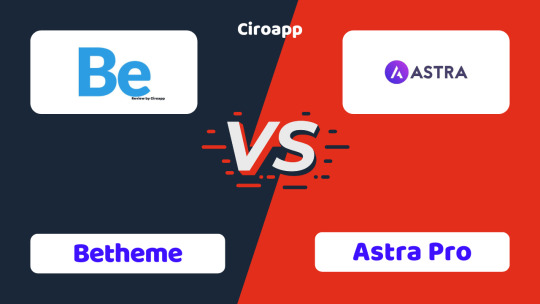
What is a Theme?
Before we dive into the details, let’s understand what a theme is. A theme is like the clothes for your website. It decides how your website looks and feels. Different themes can make your website look elegant, fun, professional, or creative. Now, let's look at Astra and BeTheme and see what makes each one special.
Astra Theme
Overview
Astra is a lightweight and fast theme. It is designed to be simple and easy to use. Many people like Astra because it makes their websites load quickly. A fast website is important because it makes visitors happy and helps your site rank higher on search engines like Google.

Features
Speed: Astra is known for being very fast. It does not have a lot of extra features that can slow your website down.
Customization: Even though Astra is simple, you can still change many things to make your website look just how you want. You can change colors, fonts, and layouts easily.
Page Builder Friendly: Astra works well with popular page builders like Elementor, Beaver Builder, and others. These tools let you drag and drop elements to create your website without needing to know any coding.
Pre-made Templates: Astra offers many pre-made website templates. You can choose one you like and then change it to fit your needs. This makes creating a website much faster.
WooCommerce Support: If you want to create an online store, Astra supports WooCommerce. WooCommerce is a plugin that helps you sell products online.
SEO Friendly: Astra is designed to be good for SEO (Search Engine Optimization). This means it helps your website show up in search engine results.
Pros and Cons
Pros:
Very fast and lightweight
Easy to use and customize
Works well with page builders
Lots of pre-made templates
Good for SEO
Cons:
Might be too simple for very complex websites
Some advanced features require the pro version
BeTheme
Overview
BeTheme is a more feature-rich theme. It comes with many tools and options, making it suitable for almost any kind of website. If you like having lots of choices and don’t mind a bit of complexity, BeTheme might be a good option for you.
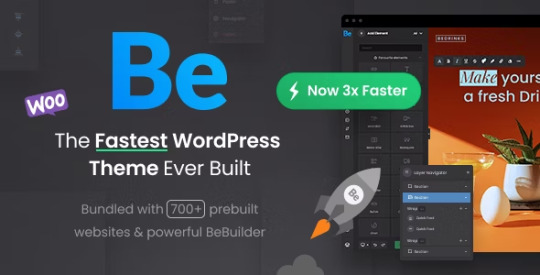
Features
Design Options: BeTheme offers over 600 pre-made website designs. This means you can find a design for almost any type of website you want to create.
Customization: BeTheme has a powerful customization tool. You can change almost every aspect of your website’s design. This includes layouts, colors, fonts, and more.
Built-in Features: BeTheme comes with many built-in features like sliders, menus, and forms. You don’t need to add extra plugins for these features, which can make your website faster and easier to manage.
Shortcodes: Shortcodes are little pieces of code that let you add different elements to your website easily. BeTheme has many shortcodes for things like buttons, columns, and galleries.
Responsive Design: BeTheme makes sure your website looks good on all devices, whether it's a computer, tablet, or smartphone.
SEO Friendly: Like Astra, BeTheme is also designed to be good for SEO.
Pros and Cons
Pros:
Lots of design options and pre-made templates
Powerful customization tools
Many built-in features
Good for complex websites
SEO friendly
Cons:
Can be overwhelming due to many options
Might be slower than lightweight themes
More complex, which means a steeper learning curve
Detailed Comparison
Speed
Astra: Known for its speed and lightweight nature. It doesn’t have many built-in features that can slow it down.
BeTheme: While still fast, BeTheme has more built-in features and options, which can make it a bit slower than Astra.
Ease of Use
Astra: Very easy to use, especially for beginners. Its simplicity makes it a great choice for those who are new to website building.
BeTheme: Offers more options and features, which can be overwhelming for beginners. It might take more time to learn how to use all its features.
Customization
Astra: Allows for a good amount of customization, but it keeps things simple. If you need more advanced customization, you might need to get the pro version.
BeTheme: Extremely customizable with a powerful tool to change almost every aspect of your website. Great for those who want complete control over their website’s design.
Pre-made Templates
Astra: Offers a variety of pre-made templates that are easy to use and customize.
BeTheme: Provides over 600 pre-made designs, covering almost any type of website you can think of.
Built-in Features
Astra: Keeps built-in features to a minimum to maintain speed and simplicity.
BeTheme: Comes with many built-in features like sliders, forms, and shortcodes, reducing the need for additional plugins.
WooCommerce Support
Astra: Fully supports WooCommerce and is a great choice for creating online stores.
BeTheme: Also supports WooCommerce and provides many design options for online stores.
SEO
Astra: Designed to be SEO friendly, helping your website rank well on search engines.
BeTheme: Also SEO friendly, with features that help improve your website’s visibility on search engines.
Which One Should You Choose?
Choosing between Astra and BeTheme depends on your needs and preferences:
If you want a fast, lightweight, and easy-to-use theme, Astra is a great choice. It’s perfect for beginners and those who want a simple website without too many bells and whistles.
If you need a highly customizable theme with many design options and built-in features, BeTheme is the way to go. It’s ideal for those who don’t mind spending extra time learning how to use all its features and want complete control over their website’s design.
Conclusion
Both Astra and BeTheme are excellent themes with their own strengths and weaknesses. Astra is great for simplicity and speed, while BeTheme offers more customization and built-in features. Consider what’s most important for your website and choose the theme that best fits your needs.
Remember, you can’t go wrong with either theme. They both have large communities and plenty of support available, so you can get help if you need it. Happy website building!
Want to read more about WordPress Themes and Plugins, Click Here
0 notes
Text
Mastering WordPress Development: From Basics to Advanced Techniques.
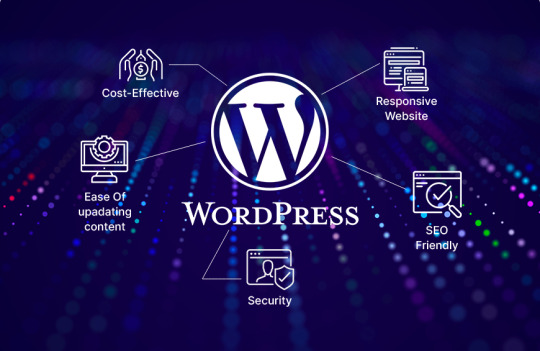
The Power of WordPress: An Introduction
WordPress has emerged as the leading content management system (CMS), empowering millions of websites across the globe. Its blend of simplicity, flexibility, and robust features make it the go-to choice for creating everything from personal blogs to enterprise-level websites.
Benefits of Using WordPress for Your Website
User-Friendly Interface: WordPress's intuitive dashboard makes content management accessible to users of all skill levels.
Limitless Customization: With thousands of themes and plugins, you can easily customize your site’s appearance and functionality.
SEO Optimization: Built with SEO best practices in mind, WordPress helps your site rank higher in search engine results.
Vibrant Community: A supportive community of developers and users provides abundant resources and assistance.
Setting Up Your WordPress Website
Installation Process: Quickly install WordPress through one-click hosting options or manually via WordPress.org.
Selecting the Right Theme: Choose a theme that is responsive, SEO-friendly, and regularly updated from the WordPress repository or premium marketplaces.
Must-Have Plugins: Enhance your site with essential plugins like:
Yoast SEO: Improve your site's search engine visibility.
WooCommerce: Set up a fully functional online store.
Contact Form 7: Easily create contact forms.
Wordfence Security: Protect your site from threats.
Customizing Your WordPress Site
Personalizing Themes: Use the WordPress Customizer to adjust your theme’s colors, fonts, and layout. For deeper customizations, modify the CSS or PHP files.
Creating Content: Differentiate between pages for static content and posts for blog entries using the Gutenberg block editor.
Menus and Widgets: Enhance navigation with custom menus and add functionality to sidebars and footers with widgets.
0 notes
Photo
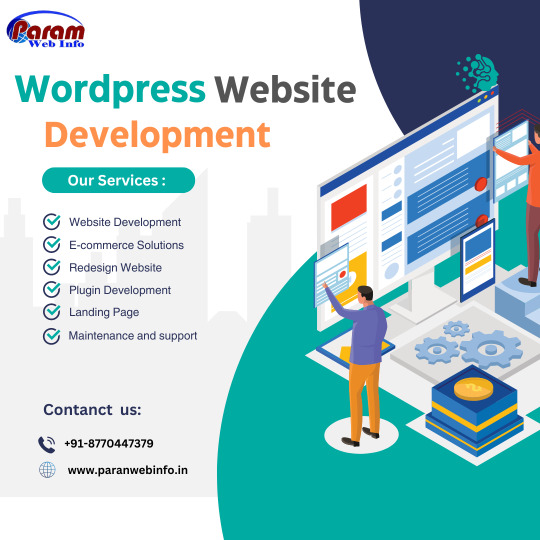
When developing a WordPress website, there are several core features and best practices to consider to ensure a robust, user-friendly, and secure website. Here are the key features: 1. User-Friendly Navigation • Custom Menus: Easily create and manage menus. • Breadcrumbs: Enhance navigation with breadcrumb trails. • Search Functionality: Utilize built-in or enhanced search features. 2. Responsive Design • Mobile-Friendly Themes: Choose themes that are responsive out-of-the-box. • Responsive Plugins: Ensure plugins and widgets are mobile-compatible. 3. Performance Optimization • Caching Plugins: Use plugins like W3 Total Cache or WP Super Cache. • Image Optimization: Utilize plugins like Smush or ShortPixel. • Minification: Minify CSS, JavaScript, and HTML using plugins like Autoptimize. 4. Content Management System (CMS) • Gutenberg Editor: Use the block editor for easy content creation. • Custom Post Types: Create custom post types for different content needs. • Media Library: Efficiently manage images, videos, and other media. 5. Security Features • Security Plugins: Install plugins like Wordfence or Sucuri for enhanced security. • Regular Updates: Keep WordPress core, themes, and plugins updated. • SSL Certificate: Ensure your site has an SSL certificate for HTTPS. 6. SEO Optimization • SEO Plugins: Use plugins like Yoast SEO or All in One SEO Pack. • XML Sitemaps: Automatically generate sitemaps with SEO plugins. • Clean Permalinks: Set up SEO-friendly URLs. 7. Analytics and Reporting • Google Analytics Integration: Track website performance with plugins like MonsterInsights. • Dashboard Widgets: View analytics directly from the WordPress dashboard. 8. Social Media Integration • Social Sharing Plugins: Use plugins like Social Warfare or ShareThis. • Social Feeds: Display social media feeds with plugins like Smash Balloon. 9. Contact and Support Options • Contact Form Plugins: Use plugins like Contact Form 7 or WPForms. • Live Chat: Integrate live chat with plugins like Tawk.to or LiveChat. • FAQs: Create an FAQ section using custom post types or plugins. 10. High-Quality Content • Engaging Text: Write clear and engaging content. • Multimedia Integration: Easily add images, videos, and other media. 11. Accessibility • WCAG Compliance: Use themes and plugins that support accessibility standards. • Accessibility Plugins: Implement plugins like WP Accessibility. 12. E-commerce Functionality (if applicable) • WooCommerce: Install and configure WooCommerce for online stores. • Product Management: Manage products, categories, and inventory. • Payment Gateways: Integrate various payment methods. 13. Regular Maintenance • Backup Solutions: Use plugins like UpdraftPlus or BackupBuddy for regular backups. • Maintenance Mode: Utilize maintenance mode plugins when performing updates. 14. Customization and Flexibility • Themes and Page Builders: Use customizable themes and page builders like Elementor or Divi. • Custom Widgets and Shortcodes: Enhance functionality with custom widgets and shortcodes. 15. User Management • Role Management: Assign different roles and permissions. • Membership Plugins: Use plugins for membership sites if needed. By incorporating these core features, a WordPress website can be highly functional, secure, and user-friendly, providing a positive experience for both administrators and visitors #wordpresswebsitefeature #wordpresswebsite #wordpressdevelopment #wordpressinraipur #landingpagewebsite #wordpresslandingpage #paramwebinfo
0 notes
Text
What is WooCommerce?
Overview of WooCommerce
WooCommerce is a popular e-commerce platform that allows businesses to set up online stores quickly and easily within WordPress websites.
Features of WooCommerce
Store Setup: WooCommerce provides tools to create and manage product listings, categories, and inventory.
Payment Options: It supports various payment gateways like PayPal, Stripe, and credit cards for seamless transactions.
Customization: Users can customize store designs using themes and plugins to match their brand.
Order Management: WooCommerce simplifies order tracking, fulfillment, and customer communication.
Extensions: There are numerous extensions available to add features like subscriptions, memberships, and shipping calculators.
Analytics: Built-in analytics provide insights into sales performance and customer behavior.
Benefits of Using WooCommerce
User-Friendly: It's intuitive and easy to use, even for beginners.
Cost-Effective: WooCommerce is free to install and use, with options to purchase premium extensions.
Flexibility: You can sell physical or digital products, services, or even bookings through WooCommerce.
Community Support: Being part of the WordPress ecosystem means access to a large community and extensive resources.
How to Get Started with WooCommerce
Install WooCommerce: Add the WooCommerce plugin to your WordPress site.
Set Up Your Store: Configure settings, add products, and customize the design.
Choose Payment Gateways: Enable payment options suitable for your business.
Enhance with Extensions: Explore and install extensions to add functionality.
Conclusion
WooCommerce is a versatile and accessible platform for launching and managing e-commerce stores. Its integration with WordPress and rich feature set makes it a popular choice for businesses of all sizes
0 notes
Text
What is WordPress
In the realm of website creation and management, WordPress stands out as one of the most popular and versatile content management systems (CMS). From personal blogs to corporate websites and e-commerce platforms, WordPress has become the go-to solution for millions of users worldwide. This article explores what is WordPress , its key features, and why it has gained such widespread adoption among developers, businesses, and individual users alike.
What is WordPress?
WordPress is an open-source content management system that allows users to create, manage, and publish websites without extensive coding knowledge. It was launched in 2003 by Matt Mullenweg and Mike Little as a simple blogging platform, but it has since evolved into a comprehensive CMS used for a wide range of websites, including business sites, portfolios, news platforms, online stores, and more.
WordPress is available in two primary forms:
WordPress.org and WordPress.com.
WordPress.org: This is the self-hosted version of WordPress, offering full control and customization capabilities. Users need to arrange their own hosting and domain, but they have access to a wide range of themes, plugins, and customizations.
WordPress.com: This version is a hosted service where WordPress takes care of hosting and technical aspects. It’s more limited in terms of customization and flexibility, but it offers simplicity and ease of use for beginners.
Key Features of WordPress
WordPress’s popularity is due to a combination of user-friendly features, flexibility, and a vast ecosystem of themes, plugins, and developers. Here are some key features that make WordPress a preferred choice for website creation:
Ease of Use: WordPress is designed to be user-friendly, allowing individuals without technical expertise to create and manage websites. Its intuitive dashboard and drag-and-drop functionality make it accessible to a wide audience.
Customizable Themes: WordPress offers thousands of themes, allowing users to change the appearance of their website without coding. These themes range from simple and minimalistic to complex and feature-rich, catering to various industries and styles.
Extensive Plugin Ecosystem: WordPress has a vast library of plugins that add functionality to a website. Whether you need SEO tools, security features, contact forms, or e-commerce capabilities, there’s likely a plugin that meets your needs.
SEO-Friendly Structure: WordPress is designed with search engine optimization (SEO) in mind. It allows users to create SEO-friendly URLs, add meta tags, and integrate with SEO plugins to improve visibility in search engine results.
Responsiveness: With more users accessing websites from mobile devices, responsiveness is crucial. WordPress themes are generally designed to be responsive, ensuring websites look and function well on different screen sizes.
Community and Support: WordPress has a large and active community of developers, designers, and users. This community creates a wealth of resources, tutorials, and support forums, making it easy to find help and learn more about WordPress.
E-Commerce Capabilities: WordPress can be used to create online stores with the help of e-commerce plugins like WooCommerce. This allows users to set up product catalogs, shopping carts, payment gateways, and more, transforming a basic website into a full-fledged online business.
Why Choose WordPress?
WordPress’s flexibility and scalability make it suitable for a wide range of websites, from small personal blogs to large corporate sites. Here are some reasons why WordPress is a popular choice for website creation:
Cost-Effective: Since WordPress is open-source, it’s free to use. Users only need to cover hosting and domain costs, making it an affordable option for creating websites.
Scalability: WordPress can grow with your needs. You can start with a simple blog and expand to a complex e-commerce platform without changing systems or undergoing a complete redesign.
Customization: WordPress allows for extensive customization through themes and plugins. Users can create a unique website that reflects their brand identity and meets their specific requirements.
Multilingual Capabilities: WordPress supports multilingual websites, allowing users to create content in multiple languages to reach a broader audience.
Security Features: With proper configuration and the right plugins, WordPress can be a secure platform for website development. Regular updates and security patches help keep websites safe from vulnerabilities.
Conclusion:
WordPress is a powerful and flexible content management system that has become the platform of choice for millions of websites worldwide. Its ease of use, extensive customization options, and supportive community make it accessible to beginners and professionals alike. Whether you’re creating a personal blog, a business website, or an e-commerce platform, WordPress offers the tools and features needed to bring your vision to life. By understanding its key features and capabilities, you can make the most of WordPress and build a website that meets your goals and stands out in the digital landscape.
0 notes
Text
What is WordPress Theme and Plugin
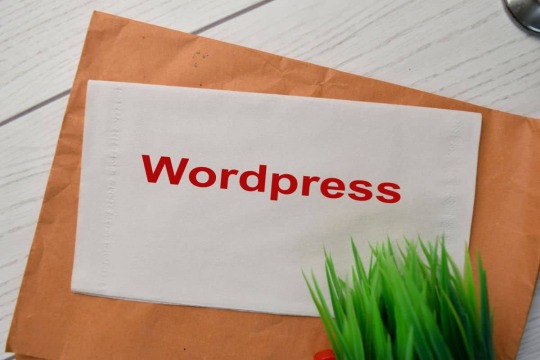
Introduction
WordPress is the world's most popular content management system (CMS), powering millions of websites across the globe. WordPress is a powerful and versatile platform that allows users to create and manage websites with ease. Whether you're a blogger, business owner, or developer, WordPress offers a wide range of tools and features to help you build and customize your site to suit your needs. In this article, we'll explore what is WordPress theme and plugin.

Image by Canva
Understanding WordPress
1. Definition of WordPress
WordPress is an open-source CMS that provides users with a user-friendly interface for creating, editing, and managing website content. It powers over 40% of all websites on the internet and offers thousands of themes and plugins for customization.
2. Importance of WordPress
WordPress is popular for its ease of use, flexibility, and scalability. It allows users to create a wide range of websites, from simple blogs to complex e-commerce stores, without the need for coding knowledge.

Image by Canva
WordPress Themes
1. What is a WordPress Theme?
A WordPress theme is a collection of files that determine the design, layout, and functionality of a website. It includes templates for different types of pages, such as the homepage, blog posts, and contact page, as well as stylesheets and JavaScript files for styling and interactivity.
2. Functions and Features
Themes control the overall look and feel of a website, including aspects like typography, colors, and layout. They may also include additional features such as custom widgets, page builders, and integration with third-party services.
3. Types of WordPress Themes
There are thousands of free and premium WordPress themes available, catering to various industries, design styles, and functionalities. Common types include blog themes, business themes, portfolio themes, e-commerce themes, and multipurpose themes.

Image by Canva
WordPress Plugins
1. What is a WordPress Plugin?
A WordPress plugin is a piece of software that adds specific features or functionality to a WordPress website. Plugins can extend the core functionality of WordPress and allow users to customize their sites without modifying the core code.
2. Functions and Uses
Plugins can perform a wide range of functions, from adding contact forms and social media buttons to optimizing SEO and improving site security. There are thousands of plugins available for various purposes, both free and premium.
3. Popular WordPress Plugins
Some popular WordPress plugins include Yoast SEO for SEO optimization, WooCommerce for e-commerce functionality, Contact Form 7 for creating contact forms, and Jetpack for site performance and security enhancements.

Image by Canva
Choosing the Right Theme and Plugin
1. Factors to Consider
When choosing a WordPress theme or plugin, consider factors such as your website's niche, design preferences, functionality requirements, user reviews, and developer support.
2. Best Practices
Stick to reputable sources for themes and plugins, such as the official WordPress repository or trusted third-party marketplaces. Always check for compatibility with your WordPress version and other installed plugins before installing.
Installation and Customization
1. Installing Themes and Plugins
Themes and plugins can be installed directly from the WordPress dashboard by searching for them in the repository and clicking the "Install" button. Alternatively, you can upload them manually via FTP or the WordPress admin panel.
2. Customizing Themes
Most themes come with customization options that allow you to adjust colors, fonts, layouts, and other settings through the WordPress Customizer or theme settings panel.
3. Configuring Plugins
After installing a plugin, you may need to configure its settings to suit your preferences and website requirements. This usually involves accessing the plugin settings page from the WordPress dashboard and adjusting the options as needed.

Image by Canva
Benefits of Using Themes and Plugins
1. Enhanced Design and Functionality
Themes and plugins allow you to customize your website's design and functionality to better reflect your brand and meet your users' needs.
2. Improved User Experience
By adding features like contact forms, social sharing buttons, and e-commerce functionality, you can enhance the user experience and make it easier for visitors to interact with your site.
3. Time and Cost Savings
Using pre-built themes and plugins can save you time and money compared to custom development. They allow you to quickly set up a professional-looking website without the need for coding skills or hiring a developer.
Security and Maintenance
1. Security Risks
While themes and plugins can add functionality to your website, they can also introduce security vulnerabilities if not properly maintained. Always keep your themes and plugins up to date to ensure they're patched against known security threats.
2. Regular Updates and Maintenance
Regularly updating your themes and plugins is essential for keeping your website secure and functioning properly. Be sure to check for updates regularly and install them as soon as they become available.
https://youtu.be/ZL8wZZINsGA?si=grxNAA-RxUpvNWlY
Video by Muhammad Talha YouTube Channel
Conclusion: What is WordPress Theme and Plugin
What is WordPress theme and plugin are powerful tools for customizing and extending the functionality of your website. By choosing the right themes and plugins and following best practices for installation, customization, and maintenance, you can create a professional-looking site that meets your needs and delights your visitors.
FAQs
1. Are WordPress themes and plugins free?
While there are thousands of free themes and plugins available in the WordPress repository, there are also premium options that offer more advanced features and support. Choose the option that best fits your budget and requirements.
2. Can I use multiple themes and plugins on my WordPress site?
Yes, you can use multiple themes and plugins on your WordPress site to add different features and functionality. However, be mindful of performance and security implications and only install what you need.
3. Do I need coding skills to use WordPress themes and plugins?
No, you don't need coding skills to use WordPress themes and plugins. Most themes and plugins come with user-friendly interfaces and customization options that allow you to make changes without writing code.
4. What should I do if a theme or plugin breaks my site?
If a theme or plugin causes issues with your site, first try deactivating it to see if that resolves the problem. If not, you may need to reach out to the theme or plugin developer for support or seek assistance from a WordPress developer.
5. How often should I update my themes and plugins?
It's essential to update your themes and plugins regularly to ensure they're up to date with the latest security patches and bug fixes. Check for updates at least once a week and install them promptly.
Read the full article
#AreWordPressthemesandpluginsfree#CanIusemultiplethemesandpluginsonmyWordPresssite#DoIneedcodingskillstouseWordPressthemesandplugins#HowoftenshouldIupdatemythemesandplugins#plugin#theme#whatiswordpressthemeandplugin#WhatshouldIdoifathemeorpluginbreaksmysite#wordpress
0 notes
Text
10 Reasons to Consider WordPress for Your First Website in 2024
In today's digital age, having a strong online presence is crucial for businesses and individuals alike. Whether you're starting a blog, launching an e-commerce store, or creating a portfolio, choosing the right platform for your website is paramount. Among the myriad of options available, WordPress continues to stand out as one of the most popular and versatile choices. In this article, we'll delve into 10 compelling reasons why WordPress should be at the top of your list when considering your first website in 2024.
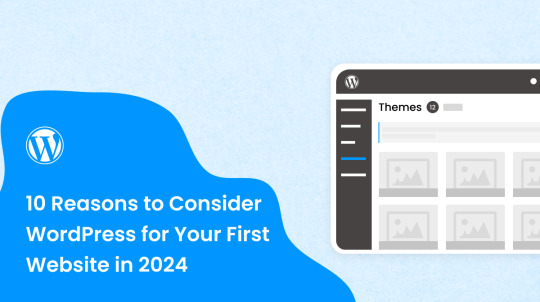
User-Friendly Interface: WordPress boasts an intuitive and user-friendly interface that makes it accessible to beginners and experienced users alike. Its simple dashboard allows you to easily navigate through settings, customize your website, and publish content without the need for extensive technical knowledge.
Flexibility and Customization: With thousands of themes and plugins available, WordPress offers unparalleled flexibility and customization options. Whether you're looking to create a sleek corporate website or a vibrant online store, you can find a theme and plugins to suit your needs and reflect your brand's identity.
SEO-Friendly: WordPress is inherently optimized for search engines, making it easier for your website to rank higher in search engine results pages (SERPs). From clean code to customizable permalinks and SEO plugins like Yoast SEO, WordPress provides the tools you need to improve your site's visibility and attract organic traffic.
Responsive Design: In an era where mobile devices dominate internet usage, having a responsive website is non-negotiable. Fortunately, WordPress offers a wide range of responsive themes that automatically adjust to different screen sizes, ensuring a seamless user experience across desktops, smartphones, and tablets.
Scalability: Whether your website receives a handful of visitors or experiences rapid growth, WordPress can scale to accommodate your needs. Its scalable architecture allows you to easily add new pages, features, and functionality as your business evolves, without compromising on performance or stability.
Community Support: As an open-source platform, WordPress benefits from a vast and active community of developers, designers, and users who contribute to its ongoing development and support. Whether you're seeking advice, troubleshooting a problem, or looking for inspiration, you'll find a wealth of resources and assistance within the WordPress community.
Security Features: Security is a top priority for any website owner, and WordPress takes this aspect seriously. With regular updates, robust password policies, secure login options, and the availability of security plugins, you can rest assured that your website is well-protected against threats and vulnerabilities.
E-Commerce Integration: If you're looking to sell products or services online, WordPress offers seamless integration with popular e-commerce platforms like WooCommerce. With WooCommerce, you can set up a fully functional online store, manage inventory, process payments, and track sales—all within the familiar WordPress environment.
Content Management Capabilities: WordPress is renowned for its powerful content management system (CMS), which allows you to easily create, edit, and organize content across your website. Whether you're publishing blog posts, uploading images, or managing multimedia files, WordPress provides a streamlined and efficient workflow.
Cost-Effectiveness: Last but not least, WordPress is incredibly cost-effective, making it an ideal choice for budget-conscious individuals and businesses. Unlike proprietary platforms that require hefty upfront investments and ongoing subscription fees, WordPress is free to use and can be hosted on affordable web hosting services, allowing you to allocate your resources more efficiently.
In conclusion, WordPress remains a top contender for anyone considering their first website in 2024, thanks to its user-friendly interface, flexibility, SEO-friendliness, responsive design, scalability, community support, security features, e-commerce integration, content management capabilities, and cost-effectiveness. By harnessing the power of WordPress, you can create a professional, feature-rich website that effectively showcases your brand, engages your audience, and drives your online success.
#wordpress#woocommerce#wordpress website#wordpress platforms#seo friendly website#responsive design#e-commerce integration#website design#website development#wordpress community#wordpress plugins#plugins#addons#wpeventmanager#event manager
0 notes
Text
youtube
Watch the 2024 American Climate Leadership Awards for High School Students now: https://youtu.be/5C-bb9PoRLc
The recording is now available on ecoAmerica's YouTube channel for viewers to be inspired by student climate leaders! Join Aishah-Nyeta Brown & Jerome Foster II and be inspired by student climate leaders as we recognize the High School Student finalists. Watch now to find out which student received the $25,000 grand prize and top recognition!
#ACLA24#ACLA24HighSchoolStudents#youtube#youtube video#climate leaders#climate solutions#climate action#climate and environment#climate#climate change#climate and health#climate blog#climate justice#climate news#weather and climate#environmental news#environment#environmental awareness#environment and health#environmental#environmental issues#environmental education#environmental justice#environmental protection#environmental health#high school students#high school#youth#youth of america#school
17K notes
·
View notes
Text
Choosing the Right Ecommerce Platform for Your Business

An online presence is crucial for businesses of all sizes. Whether you're a small startup or a large enterprise, selling products or services online opens up opportunities to reach a wider audience and grow revenue. However, with so many ecommerce platforms available, choosing the right one for your business can be a daunting task. Here are some key factors to consider when selecting an ecommerce platform.
What Are Your Options?
Based on the factors mentioned below, a few popular ecommerce platforms stand out, each with its own strengths and suitability for different types of businesses:
- Shopify: Known for its user-friendly interface and extensive app store, Shopify is a great choice for small to medium-sized businesses who want an all-in-one solution.
- WooCommerce: Built on WordPress, WooCommerce offers flexibility and customisation options for businesses already using the WordPress platform.
- Magento: Ideal for large enterprises with complex ecommerce needs, Magento provides scalability and advanced features but requires technical expertise to manage.
Factors to Consider
Business Needs and Goals
Before getting stuck into the selection process, it's important to understand your business needs and goals. Are you selling physical products, digital downloads or services? Do you require specific features like inventory management, multi-channel selling or subscription options? Understanding what your requirements are will help narrow down your options.
Scalability and Flexibility
As your business grows, so will your ecommerce needs. It's important to choose a platform that can grow with your business and accommodate future growth. Look for platforms that give you flexibility in terms of adding new features, integrating with third-party applications and handling increased traffic and transactions. If the thought of scaling your own site is daunting, then turning to a specialist agency like magecloud.agency is the way to go.
User Experience (UX)
A flawless user experience is vital for driving conversions and retaining customers. Choose a platform that offers customisable themes and templates, mobile responsiveness, easy navigation and a streamlined checkout process. Your ecommerce platform should make it easy for customers to find products, make purchases and return if needed.
Payment Options and Security
Providing multiple payment options and ensuring secure transactions are essential for building trust with your customers. Look for ecommerce platforms that support a variety of payment gateways, including credit cards, digital wallets and alternative payment methods. Additionally, prioritise platforms that are compliant with industry-standard security protocols, such as PCI DSS, to protect sensitive customer data.
SEO and Marketing Features
If you want to encourage traffic to your online store and improve visibility, choose an ecommerce platform that offers robust SEO features. This includes customisable URLs, meta tags, sitemaps and integration with marketing tools like email marketing and social media. The ability to optimise product pages for search engines will help improve your store's ranking and attract more organic traffic.
Cost and Pricing Structure
Consider the overall cost of the platform, which includes subscription fees, transaction fees and any additional charges for premium features or add-ons. Compare pricing structures of different platforms to ensure that you're getting the best value for your budget. Keep in mind that while some platforms may offer lower upfront costs, they may charge higher fees as your business grows.
Customer Support and Resources
Reliable customer support is crucial, especially if you're new to ecommerce or encounter technical issues along the way. Go for platforms that offer responsive customer support through multiple channels like live chat, email and phone. On top of this, think about the availability of resources like documentation, tutorials and community forums to help you get the most out of the platform.
Integration and Compatibility
Your ecommerce platform should seamlessly fit in with other tools and systems you use to run your business, such as accounting software, CRM systems and shipping providers. Pick a platform that offers a wide range of integrations or has an open API that allows for custom integrations.
Ultimately, the right ecommerce platform for you will depend on your unique requirements, budget and long-term goals. By carefully evaluating these factors and weighing your options, you can choose a platform that empowers your online business to thrive.
Read the full article
0 notes
Text
best e commerce platform
Choosing the best eCommerce platform depends on various factors, including the size your business, budget, technical expertise, and specific feature requirements. Below are some of the most popular eCommerce platforms, each with its own strengths and suited to different types of businesses:
1. Shopify: Known for its ease of use, Shopify is a hosted platform that offers a range of customizable templates. It's suitable for small to medium-sized businesses and provides a comprehensive set of tools, including payment processing, inventory management, and a vast app store for additional functionality.
2. Magento (Adobe Commerce): Magento is a powerful open-source platform best suited for medium to large businesses that require scalability and customization. It offers extensive features and a large community of developers. However, it may require more technical expertise or developer resources to set up and manage.
3. WooCommerce: This is a free, open-source plugin for WordPress, making it a great choice for those already familiar with WordPress. It's highly customizable and suitable for small to medium-sized businesses. It allows you to turn any WordPress site into a fully functional eCommerce store.
4. BigCommerce: BigCommerce is a hosted platform that serves a wide range of business sizes. It offers an array of built-in features, including multi-channel selling, excellent SEO capabilities, and a variety of themes. It's designed for those who want a comprehensive solution without the need for extensive customization.
5. Wix eCommerce: Wix is known for its drag-and-drop website builder, which makes it easy to create an online store. It's ideal for small businesses and entrepreneurs who want to manage an eCommerce site with minimal technical skills.
6. Squarespace: Squarespace provides beautifully designed templates and is user-friendly. It's best suited for small to medium-sized businesses that prioritize design and simplicity over extensive customization.
7. PrestaShop: A free, open-source platform that offers powerful features and is customizable with add-on modules. It's suitable for small to medium-sized businesses and requires some technical knowledge to get the most out of it.
8. Salesforce Commerce Cloud (formerly Demandware): This is a highly scalable, cloud-based platform designed for large enterprises with complex needs. It offers a range of features, including AI-powered personalization and multi-channel selling.
9. OpenCart: OpenCart is a free, open-source platform that's user-friendly and offers a simple management interface. It's suitable for small to medium-sized businesses and supports multiple languages and currencies.
10. 3dcart (now Shift4Shop): 3dcart offers a robust set of eCommerce features including advanced SEO tools and is suitable for businesses of all sizes. It's a hosted platform that provides various pricing plans, including a free tier if you use their payment processing.
11. Shopware: Popular in Europe, Shopware is an open-source platform known for its flexibility and focus on creating emotional shopping experiences. It's suitable for businesses of varying sizes and offers a high degree of customization.
Each eCommerce platform has its pros and cons, and the best choice for your business will depend on your specific needs, technical resources, budget, and growth plans. It's important to evaluate each platform carefully, considering factors like ease of use, scalability, available integrations, support, and total cost of ownership before making a decision.
0 notes
Text
WordPress Websites
WordPress has emerged as one of the most popular platforms for creating websites, ranging from simple blogs to complex e-commerce sites. Its user-friendly interface, extensive customization options, and robust community support make it a preferred choice for both beginners and seasoned developers. In this comprehensive guide, we’ll explore everything you need to know about WordPress websites, from setup to optimization and maintenance.
Please contact us email: [email protected]

Benefits of Using WordPress
Easy to Use
One of the primary reasons for WordPress’s widespread adoption is its intuitive interface, which requires no coding knowledge to create and manage a website. With its user-friendly dashboard, you can easily add content, customize themes, and install plugins with just a few clicks.
Customizable
WordPress offers a vast array of themes and plugins that allow you to customize your website according to your specific needs. Whether you’re looking to create a portfolio, an online store, or a corporate website, you’ll find a wide range of options to suit your requirements.
SEO Friendly
WordPress is inherently optimized for search engines, making it easier for your website to rank higher in search results. With features such as customizable permalinks, automatic XML sitemap generation, and SEO plugins like Yoast SEO, you can enhance your site’s visibility and attract more organic traffic.
Setting Up a WordPress Website
Choosing a Hosting Provider
Before you can start building your WordPress website, you’ll need to choose a reliable hosting provider. Look for a provider that offers excellent uptime, fast loading speeds, and robust security features to ensure optimal performance.
Installing WordPress
Most hosting providers offer one-click WordPress installation, making it quick and straightforward to set up your website. Once WordPress is installed, you can log in to your dashboard and begin customizing your site.
Selecting a Theme
WordPress offers thousands of free and premium themes to choose from, allowing you to find the perfect design for your website. Whether you prefer a minimalist aesthetic or a bold, eye-catching layout, you’ll find plenty of options to suit your style.
Adding Essential Plugins
Plugins extend the functionality of your WordPress website, allowing you to add features such as contact forms, social media integration, and e-commerce capabilities. Some essential plugins to consider include Yoast SEO, WPForms, and WooCommerce.
Designing Your WordPress Website
Customizing Themes
Once you’ve selected a theme, you can customize it to match your brand identity and preferences. Most themes offer built-in customization options, allowing you to adjust colors, fonts, and layouts without any coding knowledge.
Creating Pages and Posts
Pages and posts are the building blocks of your WordPress website. Pages are static content, such as your homepage, about page, and contact page, while posts are dynamic content that is regularly updated, such as blog posts and news articles.
Adding Media
WordPress makes it easy to add images, videos, and other media to your website. Simply upload your files to the media library and insert them into your pages and posts using the built-in editor.
Implementing Navigation Menus
Navigation menus help users navigate your website more easily, allowing them to find the information they need quickly. With WordPress’s built-in menu editor, you can create custom menus and organize your pages and posts hierarchically.
Optimizing Your WordPress Website for SEO
Installing SEO Plugins
SEO plugins like Yoast SEO provide valuable tools and insights to help you optimize your website for search engines. These plugins analyze your content, suggest improvements, and provide guidance on how to improve your search engine rankings.
Optimizing Content
Creating high-quality, relevant content is essential for SEO success. Focus on producing informative, engaging content that addresses your target audience’s needs and interests, incorporating relevant keywords naturally throughout your text.
Improving Site Speed
Site speed is a crucial ranking factor for search engines and has a significant impact on user experience. To improve your site’s speed, optimize images, leverage browser caching, and use a content delivery network (CDN) to deliver content more efficiently.
Utilizing Permalinks
Permalinks are the permanent URLs that point to your individual pages and posts. By optimizing your permalinks for search engines, you can improve your site’s visibility and make it easier for users to find your content.
Security Measures for WordPress Websites
Updating WordPress Regularly
WordPress releases regular updates to patch security vulnerabilities and improve performance. Make sure to keep your WordPress core, themes, and plugins up to date to protect your website from potential security threats.
Using Secure Plugins
When choosing plugins for your WordPress website, prioritize those from reputable developers with a track record of providing secure, regularly updated plugins. Avoid using outdated or unsupported plugins that may pose security risks.
Implementing Strong Passwords
Weak passwords are a common security vulnerability for WordPress websites. Use strong, unique passwords for your WordPress admin account and encourage users to do the same to prevent unauthorized access.
Backing Up Your Website
Regularly backing up your WordPress website is essential for safeguarding your data in case of emergencies such as hacking, server crashes, or accidental deletion. Consider using automated backup solutions to ensure regular backups without manual intervention.
Maintaining Your WordPress Website
Monitoring Performance
Keep a close eye on your website’s performance metrics, including loading speed, uptime, and user engagement. Use tools like Google Analytics to track traffic sources, user behavior, and other valuable insights.
Regularly Updating Content
Fresh, up-to-date content not only keeps your audience engaged but also signals to search engines that your website is active and relevant. Regularly update your blog, news section, or other content areas to maintain a consistent publishing schedule.
Handling Comments and Spam
If your website allows user comments, monitor them regularly to ensure they are relevant and respectful. Use comment moderation tools to filter out spam and inappropriate content and engage with your audience by responding to comments and questions.
Keeping an Eye on Security
Stay vigilant against security threats by implementing robust security measures, such as firewalls, malware scanning, and intrusion detection systems. Regularly audit your website for vulnerabilities and take prompt action to address any issues that arise.
Conclusion
WordPress websites offer unparalleled flexibility, ease of use, and customization options for users of all skill levels. By following the guidelines outlined in this guide, you can create a professional, SEO-friendly website that attracts visitors, engages audiences, and achieves your online goals.
Please contact us email: [email protected]
0 notes
Text
How to build an e-commerce website with step-by-step guidelines?
Ecommerce Website make step
1. Choose Your Niche & Business Model
Product Niche: Identify the types of products you want to sell. Consider your interests, market demand, and potential competition.
Business Model: Decide how you'll operate:
Dropshipping: Source products from suppliers who handle shipping.
Manufacturing: Make your own products.
Wholesaling: Buy in bulk and resell.
Subscriptions: Offer recurring product or service deliveries.
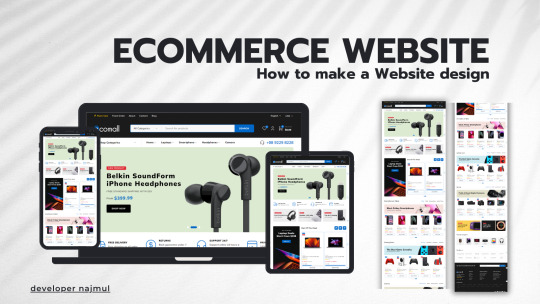
2. Select an E-commerce Platform
Hosted Platforms: These platforms provide all-in-one solutions for building and managing your store, making them a great choice for beginners. Popular options include:
Shopify
BigCommerce
Wix
Squarespace
Self-Hosted Platforms: These offer more flexibility but require technical knowledge. Popular options include:
WooCommerce (for WordPress sites)
Magento (Open Source)
3. Get a Domain Name and Web Hosting
Domain Name: Choose a memorable and relevant domain name for your business (e.g., [invalid URL removed]). Purchase it through a domain registrar.
Web Hosting: Select a hosting provider that offers reliable service and e-commerce specific features. Some platforms like Shopify and BigCommerce include hosting.
4. Design Your Store
Choose a Theme/Template: Select a pre-designed template that aligns with your brand aesthetic. Most platforms offer a wide range of customisable templates.
Customize: Tailor the template with your colors, fonts, logo, and images to reflect your brand identity.
5. Add Products
High-Quality Product Descriptions: Write compelling descriptions that highlight features, benefits, and answer potential customer questions.
Excellent Product Images: Use professional-looking product photos from multiple angles.
Product Organization: Categorize your products logically for easy navigation.
6. Set Up Payment and Shipping
Payment Gateways: Choose one or more payment gateways that allow you to securely accept credit/debit cards and other payment methods (PayPal, Stripe, etc.).
Shipping:
Set shipping rates (flat rate, calculated rates, free shipping).
Partner with shipping carriers.
Decide on a packaging strategy.
7. Optimize for Search Engines (SEO)
Keywords: Research relevant keywords that customers use to find products like yours and integrate them into your content.
On-page SEO: Optimize page titles, meta descriptions, and product descriptions.
Technical SEO: Ensure your site is mobile-friendly, loads quickly, and has a clear structure.
8. Marketing and Promotion
Content Marketing: Create blog posts, articles, or videos related to your niche to attract visitors.
Social Media: Build a presence on platforms where your target audience spends time.
Email Marketing: Collect email addresses and send newsletters, promotions, and cart abandonment reminders.
Paid Advertising: Consider PPC (pay-per-click) ads on search engines or social media.
9. Test, Launch, and Iterate
Thorough Testing: Before launch, test all functions of your site. Place test orders, try different payment methods, and navigate on various devices.
Launch: Once satisfied, officially launch your store!
Monitor and Improve: After launch, track analytics, gather customer feedback, and continually make adjustments to improve the user experience and your store's overall performance.
Important Considerations:
Security: Protect your customer data with SSL encryption and keep your platform updated.
Customer Service: Provide excellent support to build trust and customer loyalty.
Legal: Comply with e-commerce laws, taxes, and regulations.
Let me know if you want a deeper dive into any of these steps!
Thank you
Md Najmul
WordPress Developer

#ecommerce website development#ecommerce website templates#ecommerce website builder#WordPress EcommerceWordPress Ecommerce Website
0 notes
Text
youtube
Watch the American Climate Leadership Awards 2024 now: https://youtu.be/bWiW4Rp8vF0?feature=shared
The American Climate Leadership Awards 2024 broadcast recording is now available on ecoAmerica's YouTube channel for viewers to be inspired by active climate leaders. Watch to find out which finalist received the $50,000 grand prize! Hosted by Vanessa Hauc and featuring Bill McKibben and Katharine Hayhoe!
#ACLA24#ACLA24Leaders#youtube#youtube video#climate leaders#climate solutions#climate action#climate and environment#climate#climate change#climate and health#climate blog#climate justice#climate news#weather and climate#environmental news#environment#environmental awareness#environment and health#environmental#environmental issues#environmental justice#environment protection#environmental health#Youtube
17K notes
·
View notes